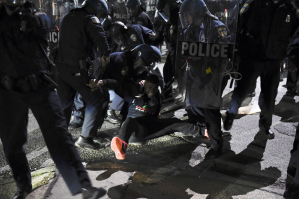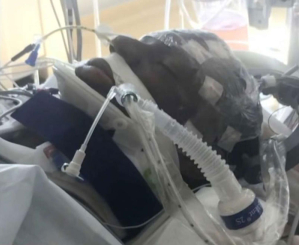
A Baltimore police document was leaked to the press on Wednesday, which claimed that Freddie Gray intentionally tried "to injure himself." However, this allegation has drawn heated skepticism.
According to Peter Hermann of the Washington Post, a prisoner who shared a police transport van with Gray told investigators that he was "banging against the walls" of the vehicle and thought he "was intentionally trying to injure himself." Jason Downs, one of the attorneys for the Gray family, has vehemently disputed that claim.
"We disagree with any implication that Freddie Gray severed his own spinal cord," Downs said, adding that the Gray family has not been notified of the prisoner's comments. "We question the accuracy of the police reports we've seen thus far, including the police report that says Mr. Gray was arrested without force or incident."
Hermann reported that the document was written by a Baltimore police investigator. It was anonymously given to the Washington Post on condition that the prisoner would not be publicly identified for safety reasons.
"The prisoner, who is currently in jail, was separated from Gray by a metal partition and could not see him," Hermann wrote. "His statement is contained in an application for a search warrant, which is sealed by the court."
According to Hermann, Baltimore police have not commented on the leaked document, although they noted that their investigation would be completed this week. The results would go to the Baltimore state's attorney's office to determine if any indictments will be made.
"The affidavit is part of a search warrant seeking the seizure of the uniform worn by one of the officers involved in Gray's arrest or transport," Hermann wrote. "It does not say how many officers were in the van, whether any reported that they heard banging or whether they would have been able to help Gray if he was seeking to injure himself. Police have mentioned only two prisoners in the van."

According to Hermann, the search warrant application stated that Gray "continued to be combative in the police wagon." An officer driving the van, which stopped a total of three times on the way to a booking center, described Gray as "irate."
"The driver made a second stop, five minutes later, and asked an officer to help check on Gray," Hermann wrote. "At that stop, police have said the van driver found Gray on the floor of the van and put him back on the seat, still without restraints. Police said Gray asked for medical help at that point."
However, there is some controversy on details behind the original report from the Washington Post. According to Andrew Hart of the Huffington Post, investigative reporter Jayne Miller of WBAL contended that Hermann's report was "inconsistent with what we reported."
"We have reported for some time that by the time that prisoner is loaded into that van, Freddie Gray was unresponsive," Miller said on MSNBC Wednesday night. "Secondly, we have no medical evidence that Freddie Gray suffered any injury that would indicate that he had injured himself."
Miller then went on Twitter to report her findings.
"We have reported that when van stopped to pick up second prisoner, sources say, Gray was unresponsive," Miller wrote. "No evidence [Gray was] banging [his] head against van."
Hart reported that even Rachel Maddow of MSNBC wondered what the real intent was behind the document leak to the Washington Post.
"Leaks like this always serve somebody's purpose," Maddow said. "We have no idea who gave this to the Post."
Police union president Gene Ryan told the Washington Post that everyone should not "rush to judgment" until all the facts have been clearly laid out.
"The facts as presented will speak for themselves," Ryan said. "I just wish everyone would take a step back and a deep breath, and let the investigation unfold."
According to the Washington Post, Gray died in hospital on April 19 after being injured while in police custody. His mysterious death triggered a strong reaction in Baltimore directed against the city's police department, which included both riots and peaceful protests.






